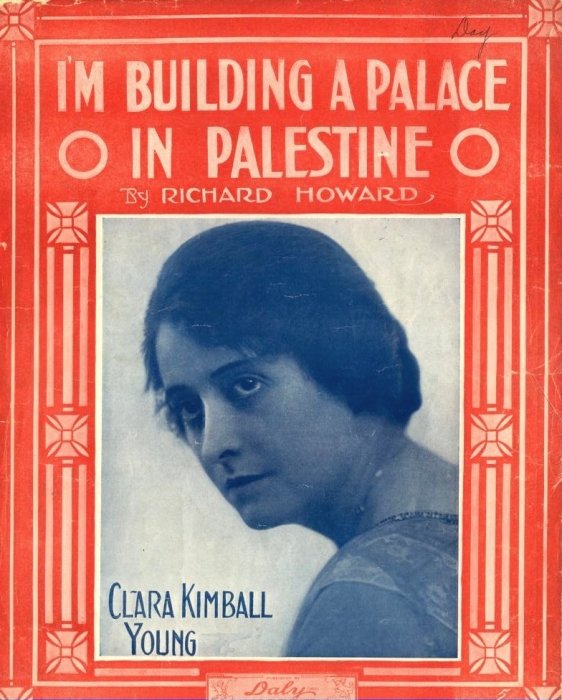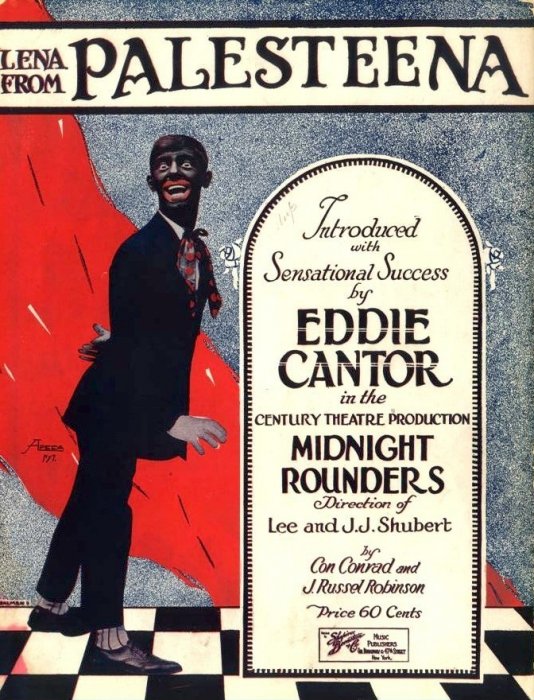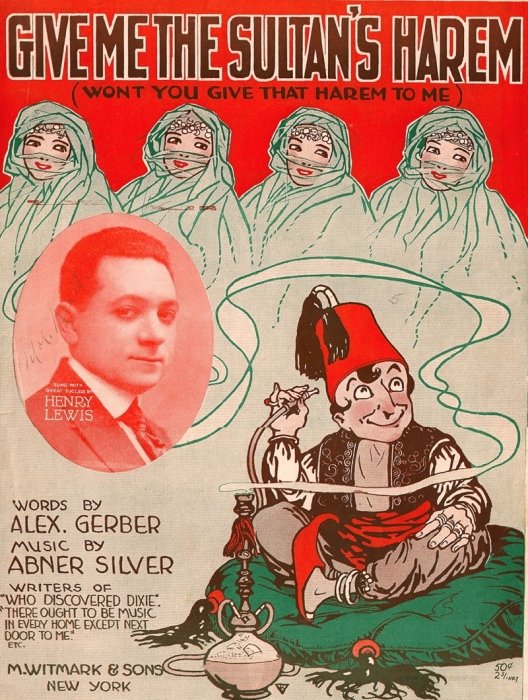
During the course of World War I European diplomats concerned themselves with international treaties and secret protocols that would determine the future of the Middle East. The interpretation of these events at the popular level fell, inter alia, to the vaudeville performers who had direct access to the American public in over two thousand theaters across the United States. In particular, the subliminal message of the songs they sang lingered in the mind long after the house lights had come up and the audiences had left.
This is a selection of songs about Palestine and the end of the Ottoman Empire that were played on the vaudeville circuits between 1912 and 1922, the years just before the Balfour Declaration and down to the Treaty of Lausanne.
Part One
First, a word about vaudeville almost a century ago. It was the ethnic melting pot of live entertainment, so songs had to reflect that reality. The songs also reflected the events of the day, whether politics, inventions or sports. The Middle East comes into the mix with that perennial attraction of oriental womanhood, Cleopatra, who gets a new pedigree in vaudeville, thanks to this song popularized by Al Jolson.
 CLEOPATRA (click here for details)
CLEOPATRA (click here for details)
Music by Harry Tierney
Words by Alfred Bryan
©1917 Jerome H. Remick & Co.
You’ve heard of Cleopatra who lived down beside the Nile,
She made a “Mark” of Anthony and won him with her smile.
They say she was Egyptian, but I’ve reason to construe
She was Jewish and Hawaiian with a dash of Irish, too.
CHORUS:
When she stroll’d with bold Mark Anthony on Egypt’s yellow sands,
You could see that she was Jewish by the motion of her hands.
She would shake her hands and shoulders off,
That’s the way she made her “muscle tough”–
I think she was Hawaiian from Honolulu too,
She would dance like this to the Yaka hoola, hicky doo-la, Yaka hoola, hicky doo.
Her mother’s name was Cleo and her father’s name was Pat,
So they called her Cleopatra, Now what do you think of that?
She had a thousand lovers in the true Egyptian style,
When she grew sick of one she threw him to the crocodile.
They say she died heart-broken after many sad regrets,
I really think she died from smoking Milo Cigarettes.
Part Two
On the political scene Zionism was a growing movement in Europe and America. Here are two songs, published in 1915 and 1916, perhaps for the Zionist Convention held in Boston in June, 1915. These songs give different faces to the movement as it developed in America. “Come Home To Palestine” is essentially a march in the manner of Sousa, but with a verse that sounds closer to the Victorian choral music of John Stainer. This song is in English, but it should be noted that there were many songs written at this time for the Yiddish Theater that supported the idea of a Return to Zion.
COME HOME TO PALESTINE (click here for details)
Zionist Campaign Song
Words by Samuel H. Borofsky
Music by Isaac Goldberg
©1915 Zionist Bureau for New England, Boston
Not far from old Jerusalem, Where milk and honey flowed,
Not far from Israel’s Temple, Where Jehovah’s spirit glowed,
In the Valley of the Jordan Which mem’ry holds divine,
I hear a voice that’s calling Come home to Palestine.
CHORUS:
Come home to Palestine, Come home to me,
Come home to Palestine, O’er land and sea.
Oh, Come home to skies of blue, Come home if your heart is true,
Homeward come to Palestine, I’m waiting for you.
Not far from ancient Zion’s mount, In the olive treasure trove,
Not far from Rishon LeZion With its golden orange groves,
Is the garden of Tel-aviv Where the exile builds his shrine,
I hear a voice that’s calling Come home to Palestine.
The Zionist dream was tempered, however, for an American audience by taking the American dream of a cottage with a rose garden as heaven-on-earth and re-locating it to Palestine, where it would, of course, become a “palace.” Building a home for Alice (not exactly a Jewish name) among the flowers is the ideal, yet the stereotypical desert sands are near-by. Missing is any mention of Palestinians, Arabs, Turks, etc. or the political realities of the day. The composer was from Keene, New Hampshire, so he had only his imagination and a set of stereotypes to work with to produce this Christian-Zionist version of life in the Holy Land.
 I’M BUILDING A PALACE IN PALESTINE (click here for details)
I’M BUILDING A PALACE IN PALESTINE (click here for details)
Words and music by Richard Howard
©1916, Daly Music Publisher, Boston
My thoughts are turning over the sea To Palestine, sweet Alice mine
My heart is yearning once more to be Among the flowers in that land of ours–
Beautiful girl of my dreams, dear, Somehow or other it seems, dear.
CHORUS:
I’m building a palace in Palestine,
A beautiful palace for you
(just for you, you know I love you true)
Where we can live when we grow old,
Where we can love till the desert sands grow cold,
There in a garden of roses
I will be faithful and true,
That’s why I’m building, sweet Alice, a beautiful palace
In Palestine, sweet gal o’ mine,
For you, for you.
Part Three
In many of the songs about the Middle East the attraction for an American (mostly male) audience was the endless supply of lovely ladies from the harem or the cities. If making the desert bloom was not enough of an incentive for young men to go east, the women might be. Here is a story about a lady by the name of Rose (this was the year of “Abie’s Irish Rose” on Broadway), and, as you will hear, the music is very romantic. “Bells of the temple” ring [in Jerusalem?]–an “orientalism” that blends the Far East and the Middle East by having the ringing of church bells in a temple or a mosque. Other than the title and the first line of the chorus, there is no indication of the land of Palestine in the song: it is a straightforward example of “boy meets girl” with a total absence of any specifics about Palestine itself, no doubt because, like the builder of that palace in Palestine, the lyricist had never been there.
 ROSE OF PALESTINE (click here for details)
ROSE OF PALESTINE (click here for details)
Music by Harold Dixon
Words by Robert E. Harty
©1922 Dixon-Lane Music Pub. Co., Chicago
Dearest, the shades of night appear
Bells of the temple ringing clear,
While I sing songs of love’s devotion,
Filled with dreams of you.
CHORUS:
Rose of Palestine, Say that you’ll be mine–
My heart’s calling, ever calling,
I love you Thru each fleeting hour, oh, fairest flow’r,
Come let the love-light shine In your eyes divine,
Shades of night seem to beckon me,
Back to you far across the sea,
Rose of Palestine.
Quite a different case is Lena. In this case the information is very specific, but stereotypes continue to set the scene. The song is a put-down of a Jewish girl from the Bronx who is over-weight, but a supposedly talented musician who gets a “gig” in Palestine. There she meets an Arab named Yousoff who falls in love with her, but we never learn if she returns the favor. Since Yousoff is an Arab, he of course has a camel to ride across the desert sands.
 PALESTEENA / LENA FROM PALESTEENA (click here for details)
PALESTEENA / LENA FROM PALESTEENA (click here for details)
(rep. LENA FROM PALESTEENA [Gem Standard Edition with guitar chords], 1947)
Words and music by Con Conrad and J. Russell Robinson
©1920, renewed 1947, Shapiro Bernstein
In the Bronx of New York City Lives a girl, she’s not so pretty,
Lena is her name;
Such a clever girl is Lena, How she plays a concertina,
Really it’s a shame;
She’s such a good musician She got a swell position
To go across the sea to entertain,
And so they shipped poor Lena Way out to Palesteena,
But now I hear that she don’t look the same:
They say that
CHORUS:
Lena is the Queen O’ Palesteena, Just because they like her concertina,
She plays it day and night, She plays with all her might,
She never gets it right, But how they love it, want more of it;
I heard her play, once or twice, Oh! murder! still it was nice;
She was fat but she got leaner Pushing on her concertina,
Down old Palesteena Way.
Lena’s girl friend Arabella Let her meet an Arab fella,
She thought he was grand,
On a camel’s back a-swayin’ You could hear Miss Lena playin’
O’er the desert sand;
She didn’t play such new ones, For all she knew were blue ones,
Still Yousoff sat and listened by his tent,
And as he tried to kiss her She heard that Arab whisper,
“Oh! Lena, how I love your instrument.”
They say that
CHORUS:
Lena is the Queen O’ Palesteena, Just because they like her concertina,
Each movement of her wrist,
Just makes them shake and twist,
They simply can’t resist, Her music funny gets the money;
There’s nottin’ sounds like it should, So rotten it’s really good;
All the girls there dress like Lena, Some wear oatmeal, some farina,
Down old Palesteena Way.
Part Four
The Turkish War was a totally different experience for American audiences than the war in Europe. The poppies of Flanders Field masked the horrors of the trench warfare on the Western Front. But as soon as the Middle East was involved, the old stereotypes take over. The Orient is the land of sultans and harems and all it takes to cause a ruckus is to send over a different sort of Turk, one described in the Oxford English Dictionary as “anyone having qualities attributed to the Turks: a cruel, rigorous, or tyrannical man,…one who treats his wife hardly [harshly]; a bad tempered or unmanageable man;” in other words an Irishman.
 MY TURKISH OPAL (FROM CONSTANTINOPLE) (click here for details)
MY TURKISH OPAL (FROM CONSTANTINOPLE) (click here for details)
Music by Edna Williams
Words by Arthur Gillespie
©1912 Joseph W. Stern & Co.
An Irish Turk named Pat McGuirk was sent to the Turkish war,
So off he went with his regiment upon a Turkish shore.
They called upon the Sultan, but the Sultan turned them down,
So they captured all the harems in Constantinople town.
A girl whose name was Opal danced her way into Pat’s heart.
Said he, “I’d like to steal you and then from this land depart–
CHORUS:
Be my little Turkish Opal from Constantinople,
I’ll be your little Irish Em’rald, and we’ll have a wedding grand.
I’ll build a little hut in clover with shamrocks all over,
You’ll be Missus McGuirk and a regular Turk in Ireland.”
Pat came back on a camel’s back with saddle built for two,
Said He, “A Turk who is named McGuirk in Ireland’s nothing new!”
They interviewed the Sultan and she begged for her release,
But he chased them and their camel out of Turkey into Greece.
They’re living now in Ireland just outside the town of Cork
And last Thanksgiving Pat brought home a Turkey and a Stork.
The diplomats could argue about the boundaries of the dismembered Ottoman Empire at the peace conference, but for vaudeville audiences there was only one thing that mattered:
 GIVE ME THE SULTAN’S HAREM (click here for details)
GIVE ME THE SULTAN’S HAREM (click here for details)
Music by Abner Silver
Words by Alex Gerber
©1919 M. Witmark & Co.
I had a dream last night that was immense,
I dreamed that I was at the Peace Conference,
Where England and France and Italy
Each got her share of her indemnity.
And after they divided up the dish,
They asked me if there’s anything that I’d wish.
I was so shy, I thought they’d die,
When I made this reply:
CHORUS:
Give me the Harem, the old Sultan’s Harem,
That’s the only thing I crave.
The Sultan’s too old, for he’s past eighty-three,
And his thousand wives need a fellow like me.
I’ll never beat them, with kindness I’ll treat them,
And all that I ask is a trial;
Imagine me sitting on a carpeted floor,
Telling my slave to bring me wife “Ninety Four.”
I’ll be so gallant, I’m chucked full of talent,
Won’t you give that Harem to me?
The diplomats all listened to my plea,
They wondered just what was the matter with me,
But I kept on asking for a trial,
I tried to show them it was worth the while.
Just then they asked if I was qualified,
And I replied, “You folks will be satisfied,
I’ll prove to you, that I’ll be true,
But here’s what you must do:”
CHORUS:
Give me the Harem, the old Sultan’s Harem,
That’s the only thing I crave,
I’ll take off the veils that they wear on their face,
The young ones I’ll keep and the old ones I’ll chase.
I’ll give them freedom, on garlic I’ll feed ’em,
So they can grow stronger for me,
King Solomon was four hundred years when he died,
If I live till forty three I’ll be satisfied,
I’ll be a wizard, a real Harem lizard,
Won’t you give the Harem to me?
ENCORE!
It becomes evident in the study of these songs that a set of stereotypes was utilized to depict the situation in Palestine for the American audience. The discrepancies between the stereotypes and the realities on the ground still affect the way in which Americans view the contemporary circumstances in Israel/Palestine.
Here is the last word in political incorrectness about the Middle East. Without fear or favor, without good sense or good taste, this song by Ray Noble lampoons male and female, Turk and Arab, Persian and Pakistani. The range of its targets is matched only by the inaccuracy of its information.
 TURKISH DELIGHT (click here for details)
TURKISH DELIGHT (click here for details)
Music by Ray Noble
Words by Max Kester
©1937 Cinephonic Music Co., Ltd.; ©1948 Campbell-Connelly, Inc.
Once there was a Caliph and he lived in old Baghdad,
He led a most unhappy life, Be-Gum, Be-Gosh, Be-Gad;
He couldn’t sleep a wink at night, he had two hundred wives
Who had to tell him stories otherwise they lost their lives.
CHORUS:
Yah-ah-ah-ah, So the [first/next] wife told her tale.
Once there was a tourist who took a trip to Turkey,
He went out for adventure when the night was dark and murky,
He tried to kiss a Turkish girl, but she remarked, “My word,
You may be fond of Turkey, but I’m not that kind of bird.”
Sinbad was a sailor, and you know what sailors are!
He sailed about the seven seas, but once he went too far.
He saw a lovely mermaid a-combing out her locks,
The naked truth upset him and he soon was on the rocks.
King Solomon, that wise old man, he had a thousand wives,
He bought a lovely tourist bus [charabanc] to take them all for drives,
The tourist bus broke down one night and here’s where trouble starts,
His wives were waiting in a row and he’d got no spare parts.
The Oriental beauties, they veil their pretty faces,
Although they aren’t so careful about some other places,
They make whoopee and aren’t found out and here’s the reason why,
A woman in a veil can never tell a bare-faced lie.
Cleopatra was a gal who always got her man,
She wooed a certain Emir who lived in Pakistan.
She wore her most exotic gown, she thought it would convince,
It did all right–He put it on, she hasn’t seen him since.
The Sultan of Morocco has a wonderful hareem,
With wives of every colour from chocolate to cream.
He’s only got three-sixty-five and yet it makes him groan,
For every time leap year comes round he has to sleep alone.